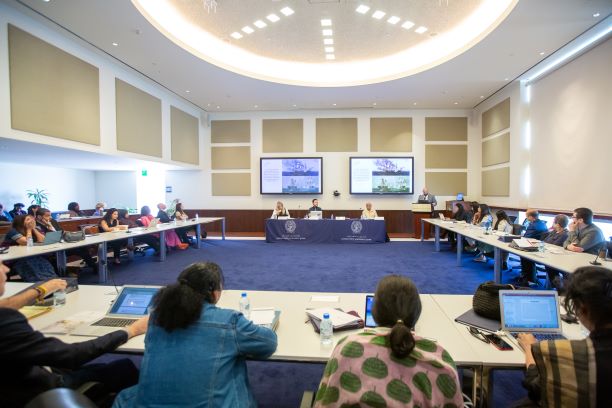Uncovering the Mysteries of the Indian Ocean’s Cultures and Exchanges Subject of Three-Day Conference at Georgetown

Participants from over 30 leading universities and institutions from around the world were in Doha from February 16-18 to take part in the Annual Faculty Conference at GU-Q, a Qatar Foundation partner university. The multidisciplinary gathering of experts spent three days exploring “Oceanic Circularities: The Indian Ocean in the Modern World,” on the diverse cultural, economic, and historical ties between the Gulf region, Asia, and Africa.
Under the theme of “circularities” that trace the mobile connections between people and places, the panelists exchanged knowledge on the boundaries and perceptions of the Indian Ocean as a region, the impact of postcolonial state building on marginalized populations, identity formation for diaspora communities, Gulf societies, Islam and lineage groups, and ecological connections through a study of pearl diving and cookbooks as important records that track available fish species, among other diverse topics.
The university hosts a faculty research conference every year, but this is the first time the annual event has merged with the school’s Indian Ocean Working Group, a collaborative research initiative between GU-Q and local and global scholars, who work to reevaluate the history of a region that has historically been under-documented.
In his welcome remarks, the dean, Dr. Ahmad Dallal, said: “The Indian Ocean World working group, which has over time formed a knowledge collective across many universities, and which has prompted the establishment of the knowledge sharing platform Firij, represents the kind of sustained inquiry into alternative world views in dialogue, preservation of historical narratives, and bringing together of experts that bears real fruit.”
Dr. Uday Chandra, conference co-organizer and working group member, says that the Indian Ocean is an important field of study because of its geographic scale, connecting a diverse array of cultures and histories. “Traditional histories of this vast region are often viewed through a European or Western perspective. Through this conference, and the working group, we want to re-evaluate many of those assumptions through a multidisciplinary lens, as well as to document areas that have been overlooked.”
With the aim of encouraging the next generation of scholars, conference organizers also invited five GU-Q students and alumni researchers to present their research to the academic community. Third year GU-Q student Irene Promodh presented her paper on the role and impact of radio programming on the Malayali community in Qatar, an ethnic group originating from the present-day state of Kerala, in India. “It was fascinating to study the way sound can help establish territory and a sense of identity,” she explained, noting that the Qatar-backed radio programming in question was only introduced two years ago, when transmission of other options ended with the blockade.
Prior to the annual faculty conference, the working group has hosted a number of symposiums and other events on the Indian Ocean rim since the group’s foundation by GU-Q and Northwestern University in Qatar faculty. The group also includes participation from Qatar University, the Doha Institute for Graduate Studies, Al Jazeera Center for Studies, and other international members, and covers a region extending from the Red Sea to the African continent, the Middle East, the Asian subcontinent, and the Far East.
Day 1
Morning Sessions
- Keynote Address: Michael Lambek, “Moral Horizons and Diasporic Return: On the Performance of Weddings in Mayotte (1975-2015)”
- Panel 1 -Thinking with the Indian Ocean
- Chair: Uday Chandra
- Panelists Fahad Bishara, Jeremy Prestholdt, and Shiza Abbasi and Uday Chandra
- Panel 2 -Literary Aesthetics of Relation and Creolization in the Indian Ocean
- Chair: Firat Oruc
- Panelests: Michelle Decker, Emmanuel Bruno Jean-Francois, Mervat Hatem, Ananya Jahanara Kabir, and Neelofer Qadir
Afternoon Sessions
- Panel 3 -The Persian Gulf in the Indian Ocean
- Chair:Anto Mohsin
- Panelists: James Onley, Lindsey Stephenson, Emilio Ocampo Eibenschutz, Al-Johara Al Thani
- Panel 4 -Soundscapes
- Chair: Maurice Jackson
- Panelists: Irene Promodh, Bindu Menon, Alghaliya Al-Qubaisi
Day 2
Morning Sessions
- Panel 5 -Oman and the Swahili Coast
- Chair: Rogaia Abusharaf
- Panelists: Nicholas Roberts, Nate Matthew, Courtney Freer
- Panel 6 -East-West Connections
- Chair: Hasan Mahmud
- Hideaki Suzuki, Mahmood Kooria, Esha Sil
Afternoon Session
- Panel 7 -Slavery and Servitude
- Chair: Sumayya Ahmed
- Panelists: Edward Alpers, Ananya Chakravarti, Karine Walther, Matthew Hopper
Day 3
Morning Sessions
- Panel 8 -Inter-Species Circularities
- Chair:Amira Sonbol
- Panelists: Mapule Mohulatsi, Tamara Fernando, Beatrice Nicolini, Nazry Bahrawi
- Panel 9 -Moving Images
- Chair: Negar Taymoorzadeh
- Panelists: Kaveh Askari, Pamila Gupta, Samhita Sunya, Firat Oruc
Afternoon Sessions
- Panel 10 -Imperial Cartographies and Meaning-Making
- Chair: M. Reza Pirbhai
- Panelists: Stéphane Pradines, Rishad Choudhury, Chhaya Goswami